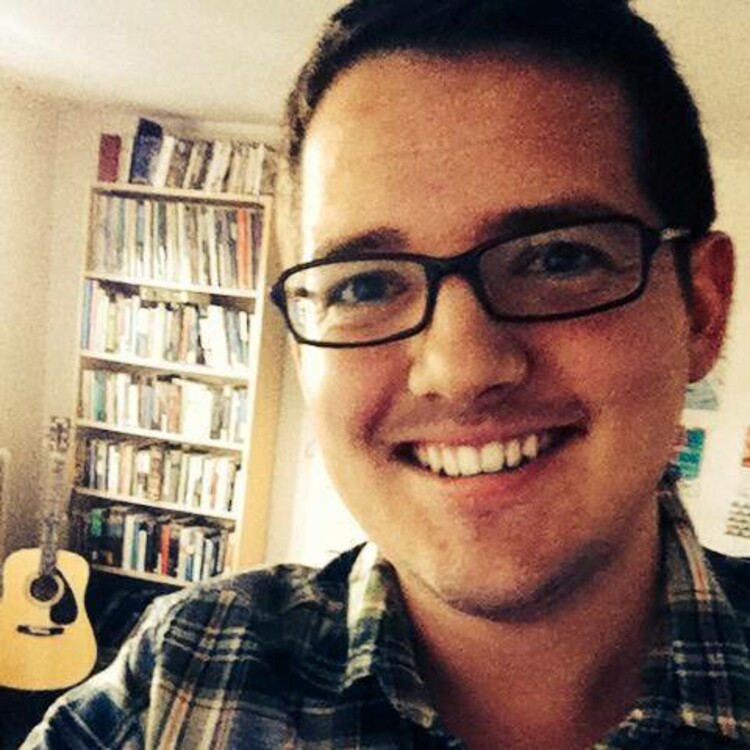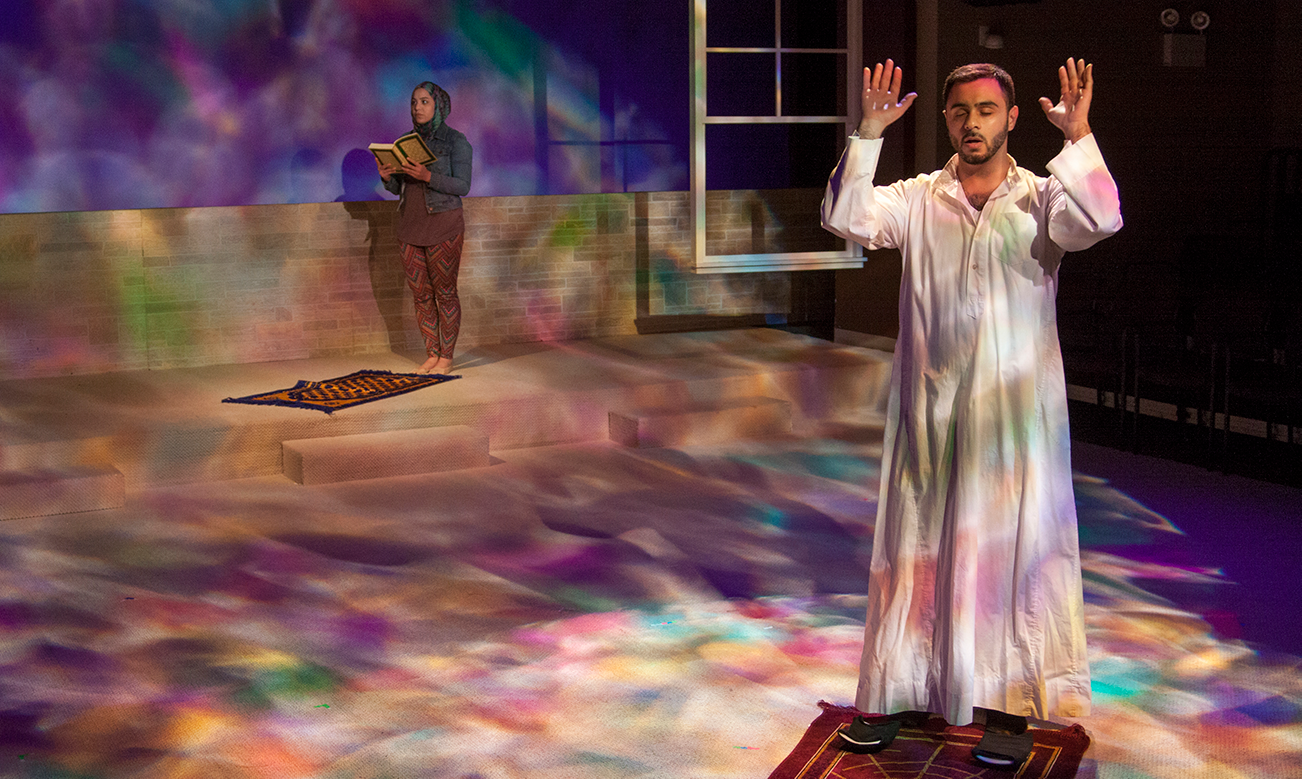I remembered the 2018 ATHE conference, when I spent four days canvassing the conference hotel for people to sign my petition to create a Middle Eastern Theatre focus group. I remembered the sting I felt when a handful of attendees (all white, all men) refused to sign the petition, often without offering so much as a simple explanation for their decision.
I remembered the Skype interview I was granted for a theatre faculty position at a liberal arts college in the Pacific Northwest. I remembered how, after talking passionately about the way diverse voices and the Middle East are reflected in the plays I teach and the art I create, one (white male) member of the committee became visibly frustrated and responded, “Sure, but what normal plays would you do?” Caught off-guard, I looked for support from the other two people on the hiring committee (both white, both men), who stared blankly at me, smiling encouragingly in anticipation of my answer.
I remembered the complicated feelings of frustration I shared with my MENA American peers when Ayad Akhtar’s Disgraced won the 2013 Pulitzer Prize for Drama. This truly Pyrrhic victory has marginally amplified MENA and Muslim visibility in the American theatre while simultaneously standing in as our sole entry within the canon of performed and studied plays. I specifically recalled one nauseating afternoon in my adjuncting years, when I was asked to guest lecture during the “Arab American theatre” day of a (white) teacher’s world theatre course, for which the students were assigned to read Disgraced. I remembered how defeated I felt having to explain to the class that not all Muslim men took pride in 9/11 and beat their wives.
I remembered the play reading I attended recently at a (white) college. I remembered my fear that the audience around me might notice the tears sliding down my cheeks as one of the characters onstage, a military veteran, talked about “ragheads” and the “camelshit” Iraqi town he leveled, and all of the people he massacred in the process. I remembered wishing I could be invisible in that moment so that the people around me wouldn’t know how deeply I’d been wounded, collateral damage to the art they were creating.
I remembered my fear that the audience around me might notice the tears sliding down my cheeks as one of the characters onstage, a military veteran, talked about “ragheads” and the “camelshit” Iraqi town he leveled.
I remembered my brief stint as a professional actor at twenty, how excited I was to be cast in a supporting role in a production of Thoroughly Modern Millie, only to realize years later that my “good fortune” was probably due to the fact that, as a Middle Eastern person, I was the closest thing our (white) director could find in the casting pool to the Chinese immigrant character I portrayed. Meanwhile, the rare instances when MENA culture is allowed to be represented in the world of musical theatre, actors of our cultural descent are not hired, and casting directors instead rely on a representational politics in which any “people of color” (and sometimes even white actors) are allowed to stand in for MENA identities.
I remembered the time I was working on a book review for an academic journal on a new text related to theatre and the Middle East, written by a (white male) scholar. I vividly recall various advisers recommending me not to publish the review, which straightforwardly addressed the book’s inaccuracies, problematic frameworks, and blatant Islamophobia. I remember that feeling of helplessness as I sent along my apology to the journal rescinding my offer to review the book, knowing that I don’t have what my mentors described as the “political capital” to publish it. I remember wondering if I’d ever earn enough “political capital” to take control of the narratives of my people—the ways we are historicized, how we are represented onstage, how we are talked about in the classroom, how we are painted in that intangible psychosphere called “discourse.”
The problem isn’t due to a lack of artists and activists trying to change these conversations for the better, especially within theatre and academic spaces. We create work, but these pieces only get produced and seen in theatre companies and festivals marked as Middle Eastern or MENA or MENASA or Arab (the list of problematic colonial-derived terminologies can go on endlessly), while Disgraced becomes one of the most regularly produced plays in the US. We audition for roles, but the only ones that pay livable wages ask us to be terrorists and taxi drivers and battered women. We apply to graduate programs but are rejected because we are told there is no one who can advise our research. We teach students, but the few (if any) plays that are anthologized or books that are published reduce us to monsters. We organize and advocate for change, but at every step of the way, we are forced to perform our worth in legible terms to the white gatekeepers of our field—an elite echelon of people who can enact systemic transformation, but who continually deny our inclusion.
Slowly our struggle is being recognized, and we are given some space to navigate who we are in relation to the white supremacist society in which we live. But the process of getting to that fabled land of equality and recognizable humanity is painful.
Incremental change is happening, and it is important to name and support this forward momentum while holding it accountable to evolving standards for inclusivity and equity. For instance, after the lengthy petition and proposal process, ATHE did vote to welcome the Middle Eastern Theatre (MET) focus group within its ranks, and the July 2020 virtual conference marked MET’s debut, bringing artists, scholars, and educators together to discuss the state of MENA art and pedagogy. In November 2019, Golden Thread hosted a national convening of theatre artists from the Middle East and North Africa, out of which grew a call to action with a common mission and the MENA Theater Makers Alliance (MENATMA). Born out of a similar feeling of lacking representation, Maia Directors was founded in 2017 to be a consulting service for organizations and artists engaging with stories from the MENASA region.
There is also a push for greater intersectional representation in the MENASA stories being told on and offstage. Queer MENASA narratives featured heavily in both the first and second annual Criminal Queerness Festival, produced by National Queer Theatre and Dixon Place in 2019 and 2020. Plays like Raphael Khouri’s She He Me and Sharifa Yasmin’s The Devils Between Us interrogate trans lives in the Middle East and its diasporas, and they will be published in the forthcoming Methuen Drama Book of Trans Plays. Playwrights and performers like Leila Buck, Betty Shamieh, Melis Aker, Sanaz Toosi, and Haleh Roshan create work that bridges MENA experiences with other minoritarian communities, while simultaneously centering female experiences in these narratives. And in response to the resurgence of #BlackLivesMatter protests and the call for police abolition, MENASA MidWest organized a three-part knowledge-sharing series on unlearning anti-Blackness in July and August 2020.
As we continue to recognize our marginality within theatre spaces, MENASA artists have started to adopt tactics for self-advocacy from the community organizing work accomplished by other minority groups. We have created organizations, facilitated town halls, and challenged the people and institutions that hold power. We have written manifestos, books, plays, TV shows, and comedy specials. Slowly our struggle is being recognized, and we are given some space to navigate who we are in relation to the white supremacist society in which we live. But the process of getting to that fabled land of equality and recognizable humanity is painful. It is dependent upon our conditional silence, negotiating those moments when speaking up and letting our frustrations and wounds be visible might actually hurt the cause, ultimately discrediting our strength, our resilience, and our ability to be respected. It is dependent upon constant appeals to whiteness, flattering the white gatekeepers who stand between our narratives and access to wider audiences, congratulating their generosity for giving us any space at all, conceding to them the white savior roleplay that is so valuable in (liberal, theatrical, academic) circles. And sometimes, no matter how hard we push, those white gatekeepers never let us in.
Staring at the “white” checkbox on the census questionnaire, I think back to the white gatekeepers in my life and the concessions I have made to appease them. By selecting white in this moment, am I crossing that threshold, that impenetrable gate, entering a world of whiteness where I, too, can be seen for the complex human I am? The white checkbox calls out to me again, this time alluringly, Imagine how much power you’ll be afforded if you were to join us. But I know the conditional nature of that power, its dependence upon my silence, my ongoing trauma, my acquiescence when people who look and sound like me are being murdered. No, I tell myself. If you venture through those gates, you’ll merely cease to exist.



Comments
The article is just the start of the conversation—we want to know what you think about this subject, too! HowlRound is a space for knowledge-sharing, and we welcome spirited, thoughtful, and on-topic dialogue. Find our full comments policy here
Important thoughts. When I was writing a play with a character from the Middle East, I wanted to make sure I didn't have any unintended cultural or religious landmines. Noor Theatre recommended Maia Directors. One of the Maia founders, director/actor/writer Kareem Fahmy, gave me a thoughtful script analysis. (Revised script getting a reading Sun Sep 23 8 pm at Riant Theatre's Jocunda Festival)